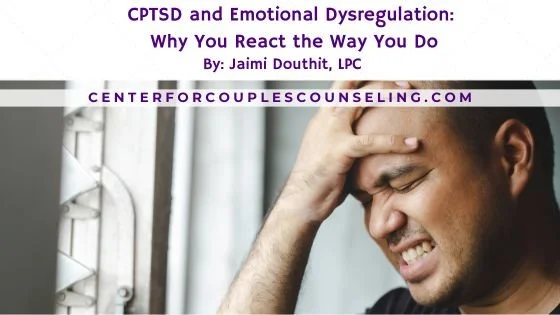CPTSD and Emotional Dysregulation: Why You React the Way You Do
If you’re someone who feels like your emotions go from 0 to 100 without warning, or like your reactions are “too much” even when you know you’re trying your best, I want your attention.
You’re not dramatic. You’re not unstable. You’re not failing at being a person. You’re dysregulated. And there’s a reason.
At its core, emotional dysregulation means you have a hard time managing your emotional responses. That could look like:
Getting overwhelmed by something small (and then hating yourself for it)
Feeling everything all at once or nothing at all
Reacting before you even realize what you’re feeling
Struggling to come back to baseline once you’re upset
And here’s the kicker: this isn’t a personality flaw. It’s nervous system stuff. It’s trauma stuff. It’s what happens when your early environment didn’t teach you how to co-regulate because, well, no one was regulating anything.
CPTSD is the blueprint for dysregulation.
With CPTSD, your emotional responses didn’t come out of nowhere. They were shaped over time by unsafe, chaotic, or invalidating environments.
You might’ve learned to:
Shut down to avoid conflict
Blow up to be heard
Read between the lines like your life depended on it (because maybe it did)
Cry alone, quietly, in your room and then act fine five minutes later
Your nervous system has been running in survival mode for years. It’s no wonder emotions feel like wild animals sometimes.
You weren’t taught how to feel safe inside your body. You were taught how to cope. And there’s a big difference.
One of the loudest challenges is that your reactions don’t match the situation… which totally makes sense. You know that moment when someone gives you “a tone” or delays a text reply and your chest tightens, your thoughts spiral, and suddenly you’re nine layers deep into “they hate me” territory?
That’s not overreacting. That’s your trauma memory pulling up old files and saying, “Last time this happened, we got hurt. Do something… now!”
Your body is protecting you with outdated data. It’s not logic - it’s imprint.
So when your partner says “can we talk?” and your stomach drops, or when you hear criticism and instantly crumble or lash out, that’s a nervous system flashing red lights. That’s emotional dysregulation rooted in lived experience. And it’s valid, even if it’s inconvenient.
Outwardly, it might look like you’re moody, reactive, sensitive, or intense. Inwardly? You’re trying to ride a tidal wave without a surfboard.
You might:
Apologize constantly, even when you didn’t do anything wrong
Go silent during conflict because your brain shuts off
Cry and not even know why
Push people away the second they get close
Over-explain yourself into exhaustion
And the worst part? You judge yourself for it. Every. Damn. Time.
Healing emotional dysregulation doesn’t mean becoming perfectly calm all the time. It means understanding your triggers, befriending your nervous system, and learning how to ride the wave instead of drowning in it. It is totally doable.
That might look like:
Naming your emotions before they explode
Using grounding techniques (like movement, breath, or touch)
Practicing self-compassion instead of self-blame
Learning to pause before reacting (hard, I know, but not impossible!)
Rewiring your brain with the help of therapy, especially somatic or trauma-informed work
This isn’t about fixing yourself. You’re not broken. This is about unlearning the survival patterns you had to develop and building new ones with safety, intention, and care. Emotional dysregulation isn't a weakness. It’s the echo of experiences where your needs weren’t met, your feelings weren’t held, and your boundaries weren’t respected. You don’t need to “calm down.” You need space to feel, tools to process, and people who get it.
So the next time you’re spiraling or melting down or stuck in a freeze - pause. Breathe. Remind yourself:
You’re not reacting “wrong.” You came by this honestly and are reacting exactly how someone would if they’ve lived through what you’ve lived through.
And that…? Makes a hell of a lot of sense.
My name is Jaimi Douthit and I’m a Licensed Professional Counselor at the Center for Couples Counseling. I love working with couples and individuals who are ready and motivated to make changes in their lives and relationships, who can handle feedback and encouragement, and engage in using the tools I teach in therapy outside of the therapy room. At the Center for Couples Counseling, we specialize in couples therapy, infertility counseling, postpartum mood and anxiety disorders, self-care and burnout, and perfectionism. We help couples and individuals in the League City and Houston areas in person, and all residents of the State of Texas online. Call us at (832) 827-3288 to schedule a free phone consultation.
Begin Couples Therapy in League City, TX
We know relationships take a lot of hard work. But your relationship is important and deserves the effort. At Center for Couples Counseling we want to help you and your partner get back on the right track. To get started with in-person or online couples therapy follow these simple steps:
Meet with one of our skilled couples therapists
Begin to see positive changes in your relationship
Other Services Offered at Center for Couples Counseling
At the Center for Couples Counseling, we understand you or your relationship may be facing different challenges. To help you work on yourself and your relationship, our Texas practice offers individual therapy, infertility counseling, postpartum anxiety, and depression counseling, therapy for self-care and burnout, and therapy for perfectionism. For more about us check out our FAQs and blog!




